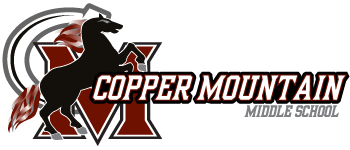The Copper Mountain School Community Council is a committee of interested community members including parents, school staff, and administrators who meet quarterly to discuss topics that impact students, parents, teachers, administrators, and the school community in general. *All members of the public are invited to attend our meetings! We hope you will share your thoughts and ideas with our council members. We value your input and together we can make a stronger school.
The purpose of the School Community Council is:
- To build consistent and effective communication.
- To give parents an opportunity to be proactive in their children's education.
- To enhance academic excellence and address student needs.
- To discuss school programs and issues.
- To develop a School Improvement Plan.
- To develop a School Land Trust Program.
- To assist in the development of the Teacher and Student Success Plan.
- To advise and make recommendations to district administrators and the School Board when appropriate.
Join our School Community Council: School Community Council Form
School Community Council Members: 2024-25
| Name | Position (Role) | |
| Ashlee Pidcock | ashlee.pidcock@gmail.com | Chair |
| Putnam, Jill | jill.putnam@jordandistrict.org | Vice-Chair (School Employee) |
| Peacock, Lauren | lauren.peacock@jordandistrict.org | Principal / Director |
| Isiko, Jackson | lsijackson@gmail.com | Parent |
| Isiko, Stephanie | srobertson99@gmail.com | Parent |
| Price, Eric | mailto:bigbluecoug@gmail.com | Parent |
Meeting Schedule
| Meeting Dates | Time | Location | Agendas | Minutes |
| 09/19/2024 | 6:00pm | Media Center | Agenda | Minutes |
| 12/04/2024 | 6:00pm | Media Center | Agenda | Minutes |
| 02/05/2025 | 6:00pm | Media Center | Agenda | Minutes (pending approval) |
| 03/12/2025 | 6:00pm | Media Center | Agenda | Minutes (TBD) |
Meeting Notes for 2023-24 School Year
Annual Plans
| Year | Teacher and Student Success Plan | Trust Lands School Improvement Plan |
| 2024-25 | 2024-2025 TSSA Plan | 2024-2025 Trust Lands Plan |
| 2023-24 | 2023-2024 TSSA Plan | 2023-2024 Trust Lands Plan |
| 2022-23 | 2022-2023 TSSA Plan | 2022-2023 Trust Lands Plan |
Funding
| Year | Annual Allocated Trust Land Funds | Annual Allocated TSSA Funds |
| 2024-25 | $151,348.79 | $215,096.86 |
| 2023-24 | $150,852.79 | $216,359.79 |
| 2022-23 | $139,495.94 | $179,636.06 |
